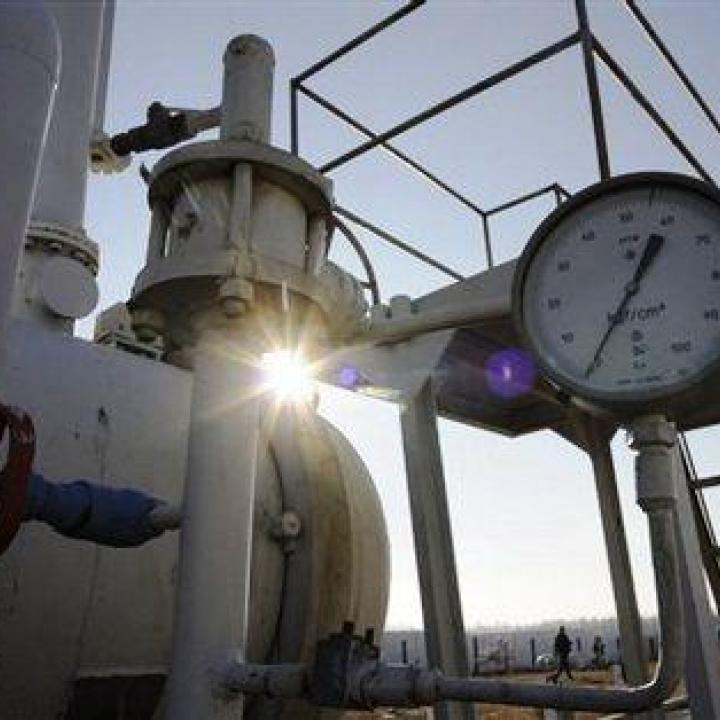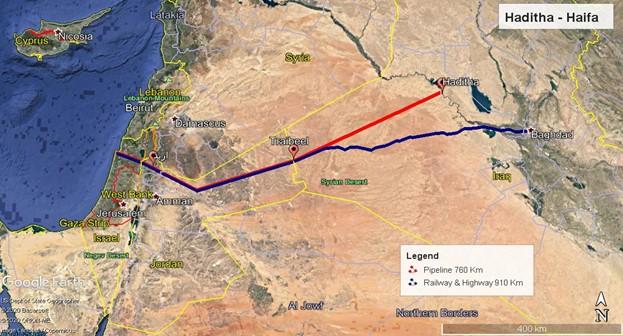
- Policy Analysis
- Fikra Forum
How a Haditha-Haifa Pipeline Would Benefit Iraq

In the midst of ongoing conflict in the Middle East, which partially stems from competition for energy sources, the role of energy transportation lines like pipelines in regional geopolitics can be a double-edged sword. While often a source of conflict and disagreement, the role of pipelines in the region appears to be transitioning into a potential source of cooperation. Pipelines can act as stable structures that can help produce security, stability, and cooperation on both economic and political levels. As Rafael Kandiyoti puts it in his book Pipelines: Flowing Oil and Crude Politics, pipelines “may contribute to mitigating and even eliminating internal conflicts.” In particular, one long-dormant proposed project, known as the Haditha-Haifa pipeline, could become a major factor for stability and prosperity in the region.
An understanding of the utility of such a pipeline dates back almost a century—a crude oil pipeline operated between the oil fields of Kirkuk and the port of Haifa between 1935 and 1948. It had originally been constructed by the Iraq Petroleum Company during 1932-1934, when the lands through which the pipeline stretched were all under British mandate. During the Arab Revolt in Palestine 1936-1939, the line became a target of both Arab resistance groups, and was later targeted by the Jewish Irgun paramilitary Organization. The pipeline’s official operation would end with the outbreak of the 1948 Arab-Israeli war, when the Iraqi government refused to pump more oil through it. Over the years, the pipeline was subjected to corrosion and rust and ultimately dismantled. While suggestions of renewing the pipeline have surfaced periodically, the pipeline continues only as a theoretical possibility.
The political conflict that initially halted the use of the pipeline remains, yet there is convincing evidence indicating that pipelines can encourage cooperation if there are clear political efforts to integrate and develop energy infrastructure in spite of a tense political or economic environment. Examples of this effect in the region include the Maghreb-Europe Gas Pipeline that spans from Algeria to Spain, the Egyptian gas pipeline to Israel, the Dolphin Gas Project and an oil pipeline between Cameroon and Chad—all clear examples of the possibility of cooperation even between actors disputing issues that range beyond economic relations to questions of culture, history, war, or justice. The construction of the Sakhalin-Khabarovsk-Vladivostok Pipeline, which was built during a period of tense regional dispute over the Kuril Islands that lie between Russia and Japan, provides another clear example of the possibility of economic cooperation in the face of unresolved international debates.
Of course, trans-boundary pipelines alone cannot achieve security and peace for the region. Without decision-makers’ belief in the relativity of their interests and the futility of zero-sum logic, such pipelines may never exist, let alone forge economic relations between adversaries. The political challenge is likely the only significant challenge to this idea; though the history of the Arab-Israeli national and religious conflict in the region constitutes a difficult obstacle to such ambitious projects.
At the same time, while Iraq has supported the Palestinian cause for seventy years, it is not engaged in conflict with Israel over land, borders or refugees, and it is not logical that Iraq continues to bear the consequences of this support indefinitely.
If it is possible to neutralize political elements and ideologies, or to adapt strategic policies towards more realistic plans aimed at stability of the region and to push for sustainable development, then politicians may be encouraged to eschew populist experiences that have born high prices. If it is possible to get leadership that pushes for policies in line with the realities of Iraqi geography, the extension of the Haditha-Haifa pipeline would prove beneficial to the region's economic and political stability.
A compromise-focused style of ideological approach is critical for the Middle East, and it will require progress. But with political support from policymakers and a greater commitment to governance and transparency, it may be possible to move away from the contested regionalism through which regional leaders view pipelines and transition to a more rational regionalism, which, as Saleem Ali writes, “implies that countries consider the logic of comparative advantage as their primary unit of analysis.”
And in spite of political challenges, it is also important to recognize that there is already some informal economic activity between the two countries. Sources like The Daily Sabah have reported that Israel currently buys Iraqi oil coming from Iraqi Kurdistan. This oil comes through a disconnected line that exports illegal oil through Turkish territory towards the port of Ceyhan, where it travels by tanker to Israeli ports in Haifa and Ashkelon. The construction of a Haditha-Haifa pipeline would make it pointless for Israel to continue this process, thus shifting these purchases to the official pipeline and the Iraqi export list.
With some changes in this direction already visible, regional actors could take advantage of the present moment to pursue local opportunities for pipeline diplomacy. For instance, were the Haditha-Haifa pipeline project to be revived, along with a parallel railway line and highway, the entire region would see a fundamental change in its political and economic conditions.
Assuming a relaxation of political tensions, extension of this Haditha-Haifa pipeline and parallel roads and railways connecting Baghdad to Haifa would bring mutual benefits for all parties. Iraq would gain shorter and easier trading access to ports on the Mediterranean Sea, with a pipeline just 760km and railway just 910km long, providing more direct routes to European and American markets and reducing transportation cost of imports. Both projects would allow Iraqi imports to arrive directly at Haifa Port from Europe and the Americas, bypassing the current route involving three seas and politically fraught chokepoints in the Bab al-Mandab Strait and the Strait of Hormuz.
As of now, cargo arriving in Iraq from Europe and the Americas is often unloaded and re-loaded at the Jebel Ali or Abu Dhabi ports and must be transferred to new ships heading for the Umm Qasr port in Iraq. With the pipeline, railroad, and highway, transportation and handling costs associated with this journey could be reduced and the shipping period would cut down as well. With 33 percent of annual Iraqi imports coming from Europe or the United States, this kind of reduction in costs and shipping times would be a great boon to the Iraqi economy.
The pipeline would also allow for the sale of about 300 thousand barrels of Iraqi oil per day in the Israeli market at current prices. The conflict over oil markets has become evident during the past decade, as was evident during the supply crisis in November 2019 and the repercussions of spread of COVID-19 that followed. The quantity of Iraqi oil sold to Israel could constitute about 10 percent of total daily sales according to Iraqi export capacity. Israeli companies adept in this field would compete to promote and market Iraqi oil given their easy access in order to earn commissions. No one doubts the ability of these companies, their penetration in the world of markets, and their ability to obtain a market advantage for Iraqi oil were they involved.
Access to competitively priced oil would be likewise beneficial for Jordan, which in turn could use its influence to ensure the security of pipeline that passes through western Iraqi lands. Jordan will have an ensured supply of oil to Jordanian refineries at a steady and inexpensive rate, avoiding the use of thousands of tankers currently used to transport oil by land—usually more than 11,000 tankers participate in transportation of oil. Jordan could likewise employ local labor for security, maintenance, and operation of the pipeline while benefitting from increased traffic on the supposed land road and railway, providing much needed jobs to Jordanians. Jordan would likewise be able to take a step away from the heavy influence Gulf states enjoy, developed in part through their own heavy supply of oil to Jordanian markets.
At the same time, the functioning of the pipeline would be in Israel’s economic interest, and Israel would seek stability in the areas through which the pipeline passes. That emphasis on stability in turn serves Iraq’s interests as well. Hopefully, political support between the two countries could follow, though current political obstacles to such a relationship will be difficult to circumvent. Given the terrain, the proposed route goes from Jordan to Israel well north of the West Bank that is the logical route for both the RR and pipeline. As such, there is no reason for the Palestinian Authority to intervene in this project. And while the PA will not likely be one of the parties directly involved in building the pipeline, it's likely be one of the beneficiaries once it begins operation.
In sum, such a project, when conducted under the right political circumstances, would bring a potential for increased economic activity and political strength for the three countries involved. The project would create a region of economic and political influence for Iraq that would include Jordan, the West Bank, and Israel. The pipeline would likewise provide a boon to Iraq’s political stance by representing a strong pressure card in any upcoming negotiations with neighboring countries on the pipeline. Generally, this prosperity and the resulting cooperation between regional actors could be a major source for peace and stability in the region.



